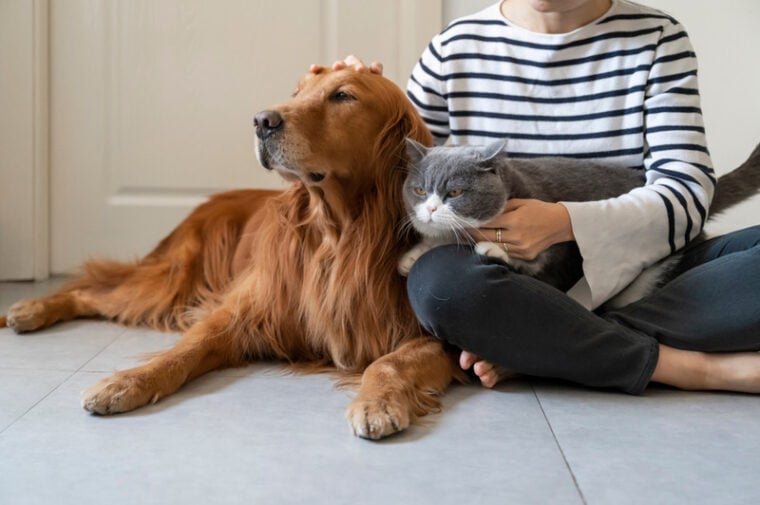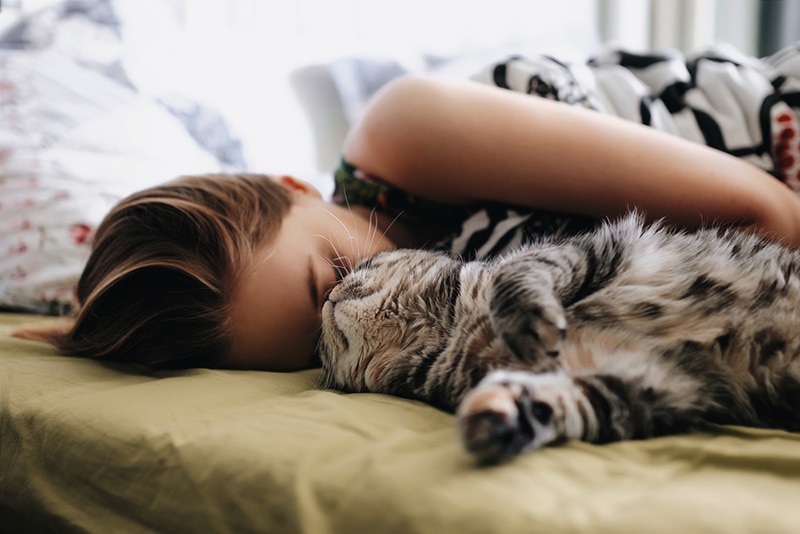
A growing body of scientific evidence has shown that having a pet can benefit mental health and well-being. Pets can provide companionship, love, and support during difficult times, as well as offer opportunities for exercise, socialization, and relaxation.
Here are seven ways in which pets can improve mental health and well-being:
The 7 Ways Pets Can Help with Mental Health and Stress
1. Companionship
Research today shows that loneliness and social isolation have a huge impact on health and well-being and contribute to shortened lifespans and poor health outcomes. The unconditional and consistent love shared by humans and their pets has huge benefits toward easing loneliness and lowering stress, depression, and anxiety. Pets also help to increase social interaction and a sense of being engaged in and connected to the world.

2. Play
As adults, we often find it difficult to shift out of habitual stress and tension patterns and let go of a sense that we are constantly burdened by responsibilities and a need to control our lives. Numbing is the most common avenue we have to try to destress, look at our phones, binge-watch TV, play video games, etc. While these activities have their place, it is well understood by now that they often do not help to reduce our stress but merely help us to push it to the side for a time.
Being engaged, moving the body, and being spontaneous all help to actively destress. To complete a stress cycle from the moment, we take on tension to the place where we can move it through our body and out of our nervous system requires action and movement. Pets are great motivators, encouraging us to be more alive in our bodies by example.
Why Play?
Pets are naturally playful as they are often much more in tune with what their bodies need than their human companions. They jump, run, tease, wrestle, and roll about. Mimicking these behaviors with your pet (throwing a ball, playing tug of war with a rope, chasing each other, and a million other forms of play) all help to free up our playful natures and, in the process, heal and restore our bodies. Play is a way to make spontaneous connections and increase a sense of flow and creativity. Pets are an incredible way to re-discover our hidden playful nature and joy.
3. Routine
Pets have their internal clocks and love to stick to a clear routine. Anyone who has been woken up by their cat or dog to be fed at six in the morning knows this! Depression and anxiety can lead to a lessening of self-care and a loss of routine and consistency. Low moods may mean skipping meals or forgetting to go out for a morning walk or work out.
Pets are insistent about their routines and will go to great lengths to remind their owners of their needs. This is an excellent way to stay in your routine and by caring for something outside of yourself to be reminded to also focus on self-care and healthy habits.

4. Responsibility
A surefire way to ease stress, anxiety, and depression is to take the focus off ourselves and our worries and to focus on being useful to someone else. Being responsible for a pet is a great way to step outside oneself and cultivate feelings of care and generosity towards another living being.
Many people fear pets will be too much work, but what they don’t account for is how rewarding it is to care for a pet; to prepare their favorite food and watch them enjoy it, to take your dog on a walk and see how they bask in the sunshine and breeze, to brush your cat and watch them purr in pleasure. Rather than adding stress, responsibility for a pet can bring a sense of satisfaction and meaning through care and attention.
A sense of purpose increases our sense of belonging to the world and can deeply improve our sense of mental well-being.
5. Touch
Seeing a litter of sleeping puppies piled together or two cats cuddled arm in arm in the deepest relaxation immediately reminds us of the importance touch plays in well-being. We often do not receive enough touch in our daily lives, and this is only becoming greater as social distance increases. Touch has a physiological effect on the body, and not only releases hormones that increase well-being, but it also can lower blood pressure and heart rates.
Animals instinctively know the importance of touch; therefore, they are intuitive companions cuddling up to you or looking for extra pats at the right moment. Pets often sense when we are stressed and move in closer seeking out connection and touch.

6. Social Interaction and Mobility
Pets are fantastic activators of social interaction between humans. For people with dogs, one of the best surprises is to discover how much easier it is to talk to other people when you are out walking the family dog. Dog walks are a great excuse to go around town and chat with people you wouldn’t normally make the time to pause and interact with. It is also a great way to get exercise and breaks up the routine of the day.
Pets make great icebreakers between humans and forge connections through shared joy. Sometimes in a family, the only thing everyone can agree upon is how much attention they want to lavish on the family pet together.
7. Mirror Your Emotions
Perhaps one of the most interesting ways a pet can improve mental well-being is by acting as a mirror to their human companions. When you build a relationship with your pet and are deeply attuned to each other’s energy and patterns, a remarkable thing occurs, you can see your moods and shifts mirrored in your pet. Pets are strong barometers of our emotions and can help us realize what we are feeling and experiencing.
When we are unconsciously angry or upset, we might recognize it when a pet moves away or is reluctant to approach. When we are sad or in pain, our pets often act as caretakers, staying close and engaging in soothing behaviors. When we are light and joyful, our pets mirror this by becoming more playful and active.
Our pets pick up on our emotional states, often long before we realize exactly what it is that we are feeling. If we pay attention to our pet’s behavior, we often get clues about our state of mind. This has a positive impact on mental health by helping to lessen isolation and increase a sense of connection and awareness.

Conclusion
In conclusion, it is evident that pets can have a positive impact on mental health and stress levels. From providing companionship to reducing anxiety, there are many ways that pets can improve our well-being.
If you are considering getting a pet, do some research to find the best fit for you and your lifestyle. Most importantly, remember to give your new furry friend plenty of love and attention.
- See also: Did You Know 41% of People Spend Over 4 Hours a Day With Their Pet? Our Surprising Survey Results!
Featured Image Credit: Chendongshan, Shutterstock









